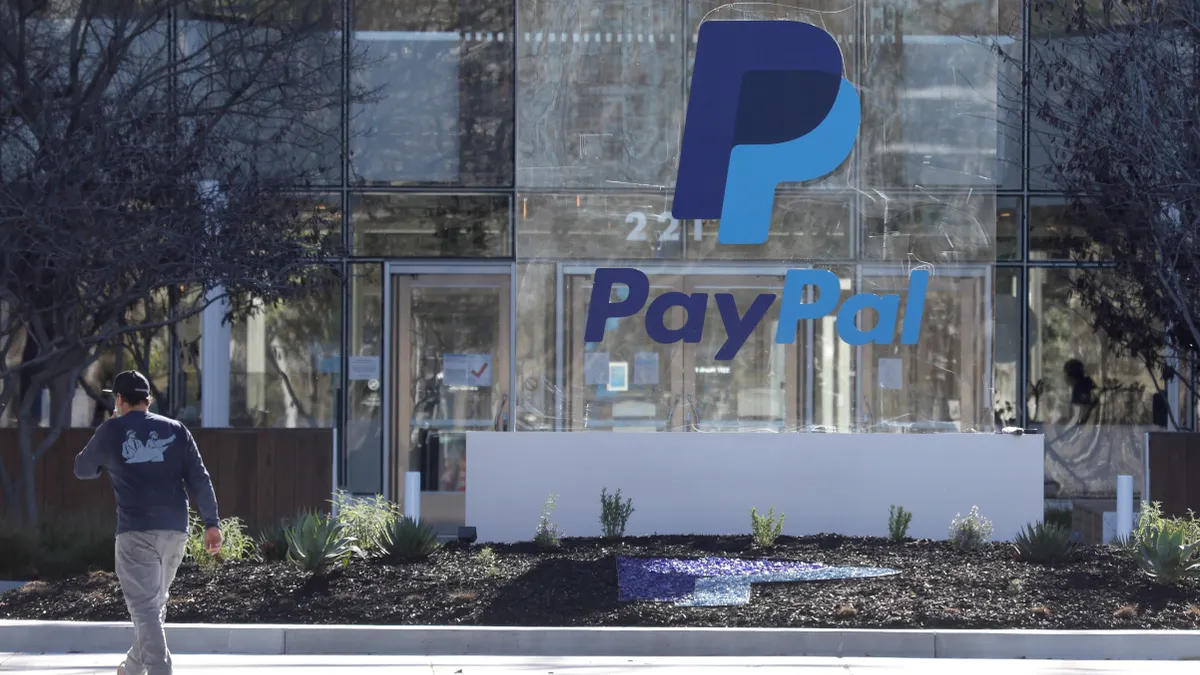PayPal’s new management isn’t finished cutting costs in its pursuit of more profitable growth, according to the digital payment company’s new chief financial officer.
Chiming in for the first time Wednesday during a presentation of the San Jose-based company’s fourth-quarter financial results, PayPal CFO Jamie Miller explained how the company would reduce its cost structure through operational streamlining while reinvesting in the business. She pointed to increased automation and productivity as being key.
“It's really important for us to just set the company up for the future and to do that -- the innovation muscle, the commercial muscle -- means that right-sizing our expense levels isn't going to be something that's one and done,” Miller said on a webcast with analysts. “We know we have significant opportunities to continue to be more efficient.”
The suggestion of more cost-cutting may not be welcome news to PayPal employees, who last week received a message that the company would cut 9% of jobs. That news came almost exactly a year after the company said it would cut 7% of its workforce.
Miller joined the company in November as part of a new management team put together by CEO Alex Chriss, who was hired just months before her as the replacement for former leader Dan Schulman.
Chriss has made clear that he aims to consolidate operations while driving improvements both for the company’s consumer and merchant customers. He lamented the need to cut jobs and eliminate open roles, but said it was necessary in the short term to generate longer-term growth.
“Our size has been slowing us down – while this was not an easy decision to make, this change is necessary to execute with the focus and speed required to drive our next chapter of growth and allow us to invest in our future,” Chriss told analysts on the Wednesday webcast.
He also reiterated that there’s room for improvement in the company’s services. In particular, he’s angling to make the PayPal app easier for consumers to use so that it speeds up their transactions while offering merchants more potential for sales.
The company’s fourth-quarter net income jumped 52% to $1.4 billion, as revenue for the quarter rose 9% to $8.03 billion and total payment volume climbed 15% to $409.8 billion, according to a fourth-quarter earnings release.
Still, analysts who cover the company expressed some disappointment that the savings PayPal is reaping must be reinvested to keep the company competitive in a new era of rivalries, and won’t show up as improved returns for investors for years to come.
PayPal historically under-invested in the business
PayPal has under-invested in the business for years, Oppenheimer analyst Dominick Gabriele said in an interview. He expects the company’s operating profit margin could be compressed to 19.4% for this year, from 22.4% for 2023. Those figures reflect the amount of reinvestment it will take to jump-start profits at the company, he explained in an interview.
“There’s going to be quite significant margin contraction, given what they’re saying and what they’re seeing,” Gabriele said. “This is going to take a while.”
That’s part of the reason that Oppenheimer downgraded its rating on PayPal last month to “perform” from “outperform,” he said.
It will be a multi-year campaign to turn around the business, he said, estimating the improvements may not show up until 2026. “It’s definitely a show-me story,” he said.
Strategy for boosting revenue
Chriss spelled out his strategy for improvements to boost revenue and profits in an online video presentation last month. Among other moves, PayPal plans to speed up check-outs by using biometrics to sign consumer users into its payment system, or by way of a guest checkout, both of which will let consumers skip password hurdles. The company is also planning to automatically offer a receipt to users that will promote follow-on purchases and cashback offers.
PayPal has struggled to jump-start profitable growth in its high-margin legacy branded business, meaning the faster expansion of its lower-margin Braintree unit has diluted profits. The pain being felt in that legacy business comes as digital payment competition has increased in recent years, with the rise of big tech company digital wallets and alternative financing such as buy now, pay later tools.
“The new CEO and CFO delivered a clear message ‘this is a transition year,’ which will require fast execution, reinvestment of cost savings and a strong focus on branded checkout and unbranded (Braintree) product innovation,” RBC analyst Dan Perlin said in a note to that financial firm’s investment clients.
PayPal has divested some assets to shrink the company, shedding its Happy Returns unit last October, just two years after buying it, and selling a European BNPL loan portfolio last year as well.
Despite the expense reduction campaign, the company’s executives declined to provide updated guidance to analysts for this year that might show what improvements to the bottom line are expected. Chriss told analysts he wanted to have a clear sense of results before revising expectations.
“These innovations remain early-stage and in-progress, and as such, minimal potential growth contributions are factored in its 2024 outlook,” TD Cowen analysts said in a Thursday investment note to that financial firm’s clients.



















